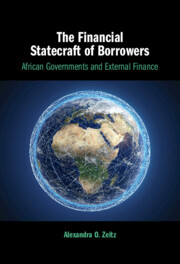Refine search
Actions for selected content:
81 results
4 - Development and Growth
-
-
- Book:
- Explaining the History of American Foreign Relations
- Published online:
- 24 October 2025
- Print publication:
- 13 November 2025, pp 82-102
-
- Chapter
- Export citation
18 - The Global Financial System and Economic Security
- from Part III - A Wider and Deeper Security Agenda
-
- Book:
- Understanding International Security
- Published online:
- 11 October 2025
- Print publication:
- 30 October 2025, pp 357-379
-
- Chapter
- Export citation
Strategies of a Rising Power: Chinese Economic Influence in Regional International Organizations
-
- Journal:
- British Journal of Political Science / Volume 55 / 2025
- Published online by Cambridge University Press:
- 31 March 2025, e52
-
- Article
-
- You have access
- Open access
- HTML
- Export citation
Foreign aid, FDI and the personalization of power in autocracies
-
- Journal:
- Political Science Research and Methods , First View
- Published online by Cambridge University Press:
- 21 March 2025, pp. 1-17
-
- Article
-
- You have access
- Open access
- HTML
- Export citation
In the South Pacific, Chinese Opportunism Meets Western Indifference
-
- Journal:
- Asia-Pacific Journal / Volume 20 / Issue 16 / September 2022
- Published online by Cambridge University Press:
- 14 March 2025, e2
-
- Article
-
- You have access
- Open access
- Export citation
3 - The Big Picture: Large-n Evidence
-
- Book:
- The Financial Statecraft of Borrowers
- Published online:
- 12 December 2024
- Print publication:
- 19 December 2024, pp 69-135
-
- Chapter
- Export citation
2 - Theory: The Financial Statecraft of Borrowers
-
- Book:
- The Financial Statecraft of Borrowers
- Published online:
- 12 December 2024
- Print publication:
- 19 December 2024, pp 31-68
-
- Chapter
- Export citation
1 - Introduction
-
- Book:
- The Financial Statecraft of Borrowers
- Published online:
- 12 December 2024
- Print publication:
- 19 December 2024, pp 1-30
-
- Chapter
- Export citation

The Financial Statecraft of Borrowers
- African Governments and External Finance
-
- Published online:
- 12 December 2024
- Print publication:
- 19 December 2024
3 - The US Congress and the Vietnam War
- from Part I - The Late Vietnam War
-
-
- Book:
- The Cambridge History of the Vietnam War
- Published online:
- 02 January 2025
- Print publication:
- 28 November 2024, pp 72-95
-
- Chapter
- Export citation
7 - International Consequences of Domestic Politics
- from Part III - Informality within Institutions
-
-
- Book:
- Informal Governance in World Politics
- Published online:
- 23 May 2024
- Print publication:
- 30 May 2024, pp 161-187
-
- Chapter
- Export citation
Follow the Giver: Is Chinese MNEs’ Investment in Africa Linked to Official Aid?
-
- Journal:
- Management and Organization Review / Volume 20 / Issue 3 / June 2024
- Published online by Cambridge University Press:
- 13 May 2024, pp. 405-424
-
- Article
- Export citation
6 - Foreign Aid
- from Part Two - The International Community
-
-
- Book:
- Australia in World Affairs 1966–1970
- Published online:
- 29 March 2024, pp 160-170
-
- Chapter
- Export citation
7 - Economic Tradecraft and Commercial Diplomacy
-
-
- Book:
- Diplomatic Tradecraft
- Published online:
- 15 March 2024
- Print publication:
- 28 March 2024, pp 150-173
-
- Chapter
- Export citation
3 - Some Lights in the Dark
-
- Book:
- The Tortuous Path of South Korean Economic Development
- Published online:
- 07 December 2023
- Print publication:
- 21 December 2023, pp 48-82
-
- Chapter
- Export citation
International charitable connections: Variation in the countries of operation of overseas charities
-
- Journal:
- Journal of International and Comparative Social Policy / Volume 39 / Issue 2 / July 2023
- Published online by Cambridge University Press:
- 15 December 2023, pp. 189-211
-
- Article
-
- You have access
- Open access
- HTML
- Export citation
Chapter 11 - “Through a Narrow Glass”: Compassion, Power, and Lyndon Johnson’s Struggle to Make Sense of the Third World
-
-
- Book:
- LBJ's America
- Published online:
- 19 October 2023
- Print publication:
- 19 October 2023, pp 281-302
-
- Chapter
- Export citation
2 - The “Good Governance Bazaar”
-
- Book:
- Good Rebel Governance
- Published online:
- 01 June 2023
- Print publication:
- 15 June 2023, pp 18-32
-
- Chapter
- Export citation
10 - Revolutionary Possibilities and International Imaginings
-
- Book:
- Good Rebel Governance
- Published online:
- 01 June 2023
- Print publication:
- 15 June 2023, pp 157-176
-
- Chapter
- Export citation
6 - Saraqeb’s “Limited Access Order”
-
- Book:
- Good Rebel Governance
- Published online:
- 01 June 2023
- Print publication:
- 15 June 2023, pp 86-104
-
- Chapter
- Export citation
